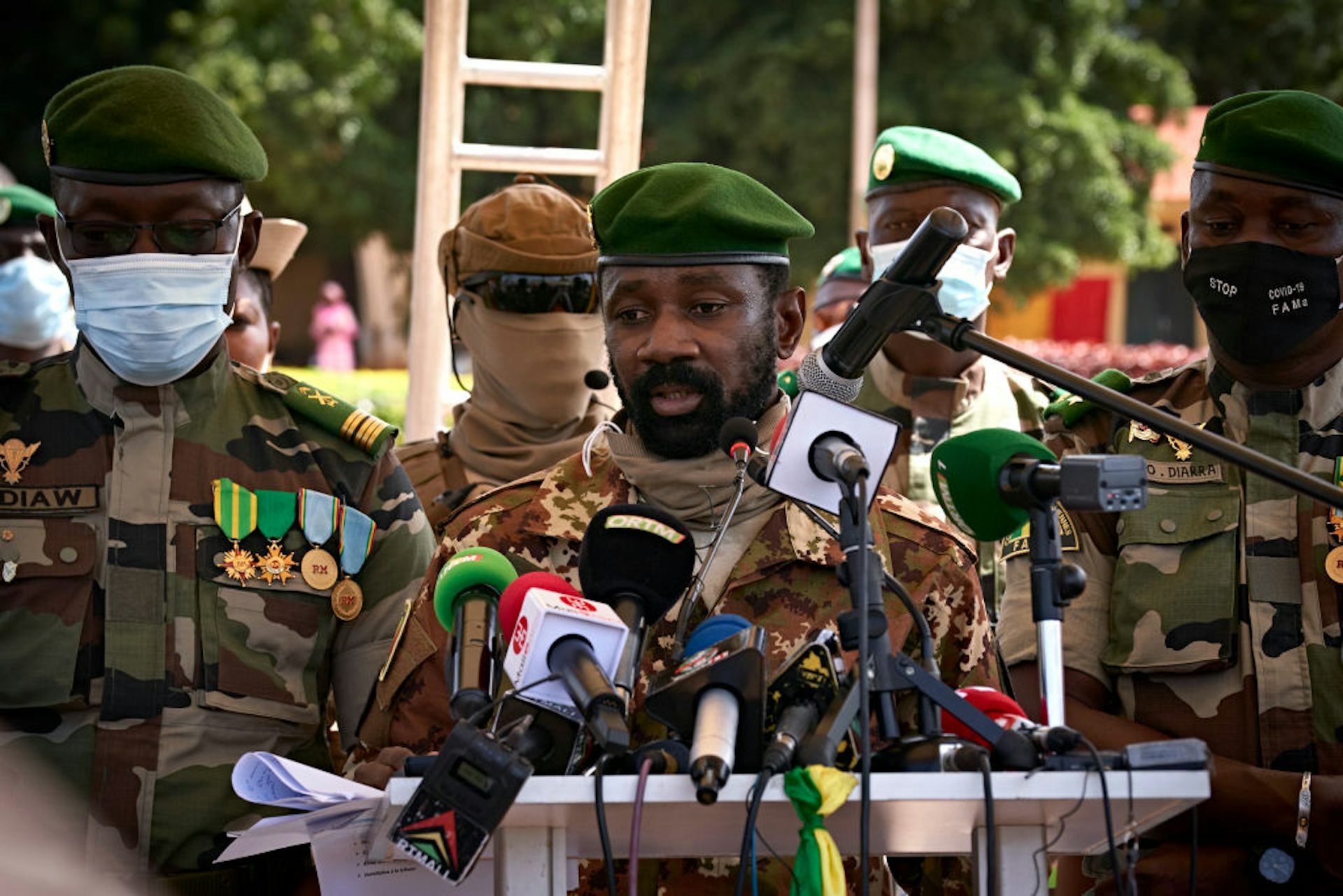
The coup in Mali on 24 May provoked a collective cry of frustration among many Malians as well as from its external partners. But it was not a great surprise.
Mali’s last coup was only nine months earlier, in August 2020. The transitional government put into place shortly afterwards was an awkward mix of putschists and politicians, led by a general brought back from retirement to sit in the presidential chair and a career diplomat made prime minister. Members of the junta held key cabinet positions as ministers of security and of defence, and Colonel Assimi Goïta, the coup leader, was named vice-president of the Transitional Council.
Goïta has now arrested the president and the prime minister and forced them to resign.
Why? And why has Mali endured three coups in less than a decade?
Regional and global players reacted with dismay. The reaction from Malians themselves was more equivocal. In Mali’s history of coups d’état – in 2020, 2012, 1991, or 1968 – all but the latest has been met with enthusiasm, even dancing in the streets. Monday’s events were met with ambivalence.
To understand why exasperation or indifference prevailed over outrage, it helps to understand the profound disillusionment – even contempt – with which many Malians regard the political class.
The unravelling
In recent weeks, the power-sharing arrangement between military officers and civilians was clearly foundering. President Bah N’daw had briefly dismissed Prime Minister Moctar Ouane, before bringing him back on board. But Ouane struggled to form a government. Teachers’ salaries were going unpaid, and the country’s leading labour union had launched a strike. The steady drip of corruption never ceased. All of that, sad to say, was more or less business as usual.
By all accounts, the trigger for the coup was the proposal to remove members of the transitional government, prying from their hands the power they had recently seized and grudgingly shared.
Mali’s external partners looked aghast at this seizure of power, as the transitional agreement they worked hard to support fell apart.
ECOWAS, the association of West African states, pointed out that Mali risked losing its neighbours’ support in the struggle against jihadist violence. The US, deeply engaged in Mali and in the wider Sahel, suspended military cooperation with Mali and threatened to enact targeted sanctions. In regalian tones, French president Emmanuel Macron insisted that the coup was “unacceptable”. Rich, given that he had condoned an unconstitutional seizure of power in Chad a fortnight earlier.
Popular reaction in Bamako has been more nuanced.
Many Malians were exasperated by news of the coup, and the hashtag #Wuli (“Stand up!”) popped up in Twitter feeds. It is of course easier to tweet than to hit the streets, and the Twitterverse is hardly representative of Malian discourse. Other Bamakois, reached by phone, sighed in resignation as the political drama unfolded in the hills above town.
Their contempt for politicians had trumped any hope that a change of leadership – however it was achieved – would bring change.
Unseemly alliances
The truth is that Malian politicians – with a few notable exceptions – bear responsibility for the tumult at the pinnacle of the state. The first and most obvious is by welcoming, even celebrating, an illegal seizure of power that might open up opportunities for them. In a sclerotic system in which some of them have failed for decades to rise to the top, every coup is an opportunity.
This is particularly true of the coalition known as the “June 5 Movement-Rally of Patriotic Forces”, commonly referred to as “M5-RFP”. They were prominent in last summer’s mass demonstrations that helped force President Ibrahim Boubacar Keita from power. Under duress, Keita resigned, but the rewards that the civilian opposition expected failed to materialise.
As crowds celebrated the officers who had deposed Keita, the politicians were too eager to believe that the men in uniform had done their work for them. Yet the soldiers did not take power in order to share it. When they did parcel out positions, the leadership of the M5-RFP was disappointed: nothing for them.
Another coup is an opportunity to claim power that they have not been able to win on their own.
They might be right.
In August, in order to placate foreign powers, Goïta and his comrades needed civilian partners who would know their place. N’daw and Ouane seemed to be playing that role until suddenly, this week, they were not. They are off-stage, but the junta still needs some civilians among the soldiers’ camouflage.
Goïta declared that in spite of the week’s events, elections would be held in 2022, although he did not specify that they would occur in February as had been planned. Whatever his intentions might be, he will need to expand his political base, and he will need civilians willing to accept positions in the government. Were they committed constitutional republicans – or merely cagey survivors hoping to keep a clean slate for the future – Mali’s political leaders might refuse categorically to be part of a government that has come to power by force. Instead, they cheer from the sidelines, hoping to be called off the bench and into the match.
With all that in mind, the question is not why stage a coup, but why not? The jihadist insurgency that has bedevilled Mali for nearly a decade has only raised the stakes for the mid-ranking officers who have actually served in the field. They see both the politicians and their own generals as corrupt and illegitimate.
Meanwhile, Amadou Haya Sanogo, who led the disastrous coup of 2012, has never been put on trial for his crimes, which include killing fellow soldiers. Instead, he and every other coup leader has been applauded, and each has seen his fortunes rise.
Why would the current crop of colonels act any differently than they have?![]()
Gregory Mann, Professor, Columbia University
This article is republished from The Conversation under a Creative Commons license.

